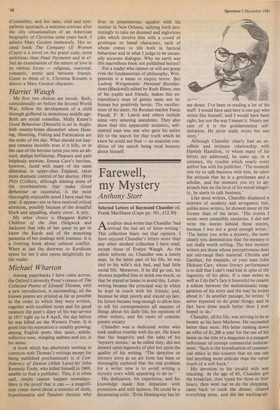Michael Wharton
Among paperbacks I have come across, the Oxford University Press's reissue of The Collected Poems of Edward Thomas, with a new introduction, is outstanding; all the known poems are printed as far as possible in the order in which they were written, together with excellent notes and for good measure the poet's diary of his war service in 1917 right up to 8 April, the day before he was killed on the Western Front. It is good that his reputation is steadily growing; among English poets that quiet, subtle, reflective tone, mingling sadness and joy, is his alone.
A book which has absolutely nothing in common with Thomas's writings except for being published posthumously is A Confederacy of Dunces (Allen Lane) by John Kennedy Toole, who killed himself in 1969, unable to find a publisher. This, it is often said, simply cannot happen nowadays. Here is the proof that it can — a magnificent comic novel about a monster of sloth, hypochondria and flatulent rhetoric who lives in preposterous squalor with his mother in New Orleans, sallying forth protestingly to take on doomed and inglorious jobs which involve him with a crowd of grotesque or banal characters, each of whom comes to life both in farcical behaviour and in what I judge to be uncannily accurate dialogue. Why on earth was this marvellous book not published before?
For a reader who cannot or will not grasp even the fundamentals of philosophy, Wittgenstein is a name to inspire terror. But Ludwig Wittgenstein: Personal Recollections (Blackwell) edited by Rush Rhees, one of his pupils and friends, makes this extraordinary man of genius seem not inhuman but positively heroic. The recollections of his sister, his Russian teacher Fania Pascal, F. R. Leavis and others include some very amusing anecdotes. They also show that this apparently eccentric, selfcentred man was one who gave his entire life to the search for that truth which he knew he could not find — an essential condition of the search being total honesty about himself.










































 Previous page
Previous page